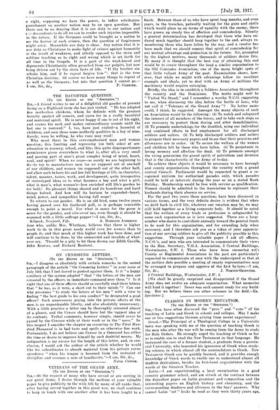ON CENSORING LETTERS.
[To ran EDITOR or ran "Seeeriroa."] Sta,—I disagree so absolutely with certain remarks in the second paragraph of the article "On Censoring Letters" in your issue of July 14th that I feel forced to protest against them, is it "a happy corollary of the system adopted" that " the letters of the men are censored by the officers in immediate command over thesis "? Is it right that one of these officers should so carefully read their letters that "he has, as it were, a short cut to their minds "? Can one who presumes "to study the letters of his men" with a view to finding '' the best guide to his own conduct" be designated a good officer? Such unnecessary prying into the private affairs of the men is an unpardonable liberty, and also absolutely unnecessary. With a little practice a letter can be thoroughly censored almost at a glance, and the Censor should have but the vaguest idea of its contents. Verbal comments, however simple, should never be pissed by the Censors while at their work or in the '' mess." In thia respect I consider the chapter on censoring in The First Hun- dred Thousand is in bad taste and spoils an otherwise fine work. Fortunately, I do not believe one Censor in a thousand has either the time or desire to improve himself by such doubtful means. My indignation is my excuse for the length of this letter, and, in con- clusion, I would ask the author of the article whether he would like his subordinates to absorb material from his private corre- spondence " when his tongue is loosened from the restraint of discipline and assumes n note of familiarity,"-1 am, Sir, de.,
NATAL CENSOR.


































 Previous page
Previous page